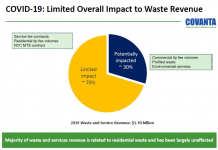Jim Lane
In New York, Sweetwater Energy and Pacific Ethanol (PEIX) announced a project to supply customized industrial sugars for the production of cellulosic ethanol. The agreement supports the construction of a cellulosic biorefinery, contingent upon Sweetwater Energy obtaining the necessary financing and permits, at the Pacific Ethanol Stockton facility capable of producing up to 3.6 million gallons of cellulosic ethanol annually.
Pacific Ethanol operates and manages four ethanol production facilities, which have a combined annual production capacity of 200 million gallons in Boardman, Oregon, Burley, Idaho and Stockton, California, and one idled facility is located in Madera, California.
Sweetwater Energy will use its patented, decentralized process to convert locally available cellulosic material, such as crop residues, energy crops, and wood waste into a sugar solution, which Pacific Ethanol will ferment into cellulosic ethanol at its Stockton, CA refinery.
Fifth major deal of 2013 for Sweetwater
The deal is the fifth major deal announce by Sweetwater in 2013. In addition to Pacific Ethanol, the company announced similarly-structured agreements with Colorado-based Front Range Energy and Ace Ethanol, both in January. More about those, here.
In March, the company announced a $250 million, 15-year pact to provide Naturally Scientific with customized industrial sugars, in a transaction valued at $250 million.
In October, Naturally Scientific and Sweetwater announced a project to produce sugar from waste carbon dioxide. The new technology converts carbon dioxide taken directly from the emissions of industries such as ethanol refineries, natural gas power plants and many others, into usable sugars and expands Sweetwater’s sugar-production reach beyond biomass-based, second-generation feedstocks into third-generation feedstocks.
Adding the ability to create sugar from carbon dioxide means Sweetwater can supply biomass- based sugar to an ethanol refinery, for example, and then also capture the carbon dioxide that’s a byproduct of the ethanol production to create emission-based sugars, which can be turned into oils, biodiesel, or other products.
Reaction from the partners
Neil Koehler, CEO of Pacific Ethanol, stated, “An important part of our long-term strategy is to take advantage of the flexibility of our plant infrastructure to process alternate feedstocks such as sugar, corn and other grains, and now sugars produced from cellulosic material. The Sweetwater platform furthers our initiative in producing next-generation fuels such as cellulosic ethanol while providing additional flexibility in sourcing, reducing feedstock costs and enhancing plant operating margins.”
“We are very pleased to work with Pacific Ethanol on this project,” says Arunas Chesonis, Chairman and CEO of Sweetwater Energy. “We are going to start by supplying up to 6 percent of Pacific Ethanol Stockton’s feedstock requirements and, as our partnership grows we will evaluate increasing the amount.”
Jim Lane is editor and publisher of Biofuels Digest where this article was originally published. Biofuels Digest is the most widely read Biofuels daily read by 14,000+ organizations. Subscribe here.








